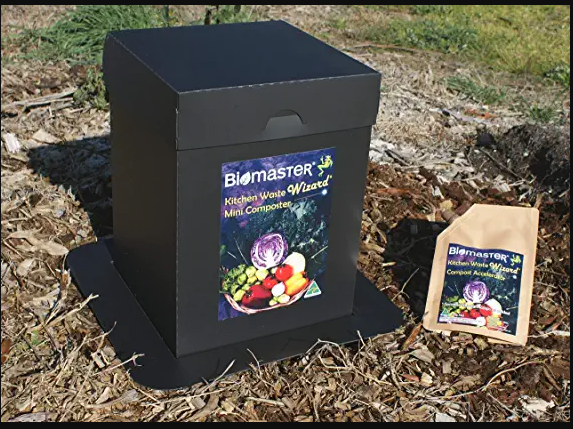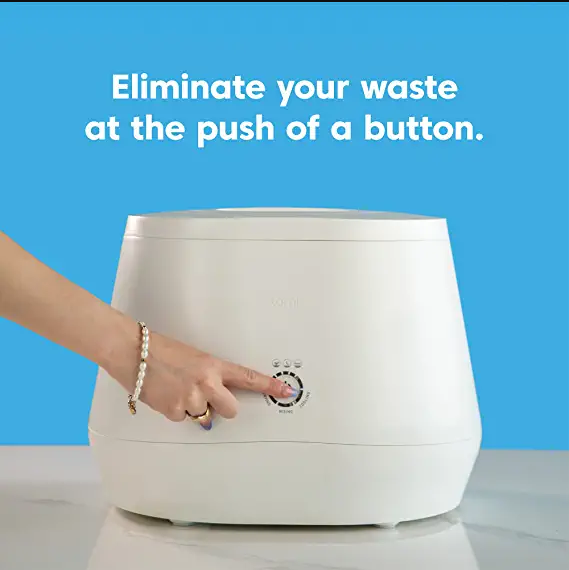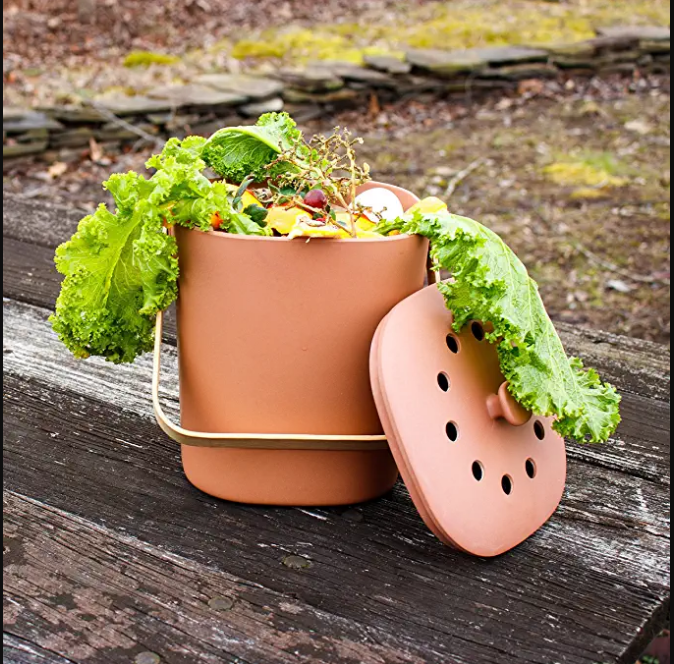So you’ve decided to compost your food waste, but where do you start? The good news is that it’s easy! Check out this list of eight great things to add to your mini composter.
What is a Mini Composter?
A mini composter is a small plastic bin that you can use to make compost. It’s usable inside or outside, and it’s best for kitchen scraps, coffee grounds, eggshells, and other organic materials. If you’re looking to add some life to your garden but don’t have much space (or just want something more convenient than laying down peat moss), this may be the right option for you!
How does the Mini Composter work?
The Mini Composter is a compost bin and worm farm in one. The worms eat the food scraps you put in and excrete worm castings. These are rich in nutrients and usable as a fertilizer.
Here’s how it works:
- You add your food scraps to the collection tray at the bottom of your mini composter. A lid on top of this tray keeps out any unwanted critters. This allows airflow so that decomposition can happen faster.
- Worms live inside tunnels that go through the inside of your mini composter; they will start eating those scraps immediately! They’ll also eat any dead worms that fall into their tunnel network. This means that if there’s enough space between layers of food scraps. They’ll probably leave some behind for others to enjoy later on down their line. It ensures all those nutrients will not go to waste). So don’t worry about not adding enough. It’s safe to pile them higher than 5-10 cm (2-4 inches).
8 Fantastic Things To Compost In Your Mini Composter
Eggshells
Eggshells are a rich source of calcium, which is crucial for plant growth. As such, eggshells are an essential part of any composting effort. They will help balance the pH of your compost and you can able to make compost tea!
Eggshells also provide benefits for you: they’re alkaline. Using them in your compost will increase the pH level naturally. This can reduce pests and diseases without having to use harsh chemicals or pesticides. They’ll also help break down organic matter faster and more efficiently than other types of carbon-based material. This means that it takes less time for you to get results from what you’ve put into your mini-composter!
Biodegradable paper towels and napkins
Paper towels, napkins, and toilet paper aren’t compostable. However, not all paper products are biodegradable. Toilet paper and facial tissues come from wood pulp which breaks down very slowly. Recycled or unbleached paper products break down faster than their bleached counterparts because the dyes are not as stable.
Also, some paper products contain toxins that inhibit the breakdown process of your compost heap. It is important to read labels before putting any product in your little composter!
Kitchen scraps
Kitchen scraps are a great addition to your compost pile. They can provide a good source of nitrogen, carbon, water, and air for the microbes in your garden soil.
Kitchen scraps are high in nitrogen. Nitrogen is a chemical element that provides fuel for microbes that break down organic materials into fertilizer for plants. When we have plenty of nitrogen-rich food waste in our compost piles. We can be sure there will be plenty of extra nutrients to feed our gardens with!
Kitchen scraps are high in carbon. Carbon is another important ingredient needed by microorganisms when they break down organic matter into soil humus. Soil Humus is a substance which comes from dead plant material that helps improve water retention. As with nitrogen, too much carbon will slow down the decomposition process. So add only small amounts at first until you see how much decomposing material you get out of each batch before adding more scavenged items.
Coffee grounds and filters
Coffee grounds and filters are a great source of nitrogen, carbon, air pockets, and water. The coffee grounds provide you with an excellent source of nitrogen. Nitrogen is necessary for plants to thrive and grow properly. It helps give the plants strength by promoting healthy root development as well as strong leaves that can withstand the effects of drought or other environmental stresses.
The air pockets provide structure for your compost pile. This makes it easier for your compost to break down into rich soil that you can use in your garden or around your home. The water from the coffee grounds will help keep everything moist in the mini composter so that there isn’t too much moisture or less on one side. That way, different types of bacteria don’t live in one place or another because they thrive off moisture.
Tea bags and loose tea leaves
Tea bags and loose tea leaves are a great addition to your composting routine. They’re usable in the same way as coffee grounds and leftovers, but they won’t break down as quickly. If you have an active compost pile, however, tea bags will decompose just fine if kept in a sealed container for about three days before adding them to your pile.
You can also use tea leaves for other types of composting. For example, place them alongside fruit and vegetable scraps that you’ve been saving for future batches of homemade fertilizer. But remember that tea bags are not biodegradable so they should keep separate from other compostables!
Houseplants and Plant Trimmings
Plant trimmings and plant leaves are great for composting. You can even compost your entire houseplant, as long as it doesn’t have any soil in or on it. Just take off the soil, shake off excess water, and place it on top of your mini composter.
You can also use plant stems and roots to add to your composting efforts. All these things will decompose once they get into the right environment. So don’t be afraid to throw them in there!
Food Waste
Food waste is a great addition to your composting routine. It’s biodegradable and a renewable resource, so it won’t hurt the environment. You can also use food waste as fertilizer for indoor plants or outdoor gardens. However, it’s important to note that while composting food waste is good for the planet, sending it to a landfill is not!
A) Compost them! The best way to keep harmful chemicals and pathogens out of our landfills is to turn them into something else—like soil! Check out these tips on how to recycle your old produce before tossing them in the trash!
B) Recycle them! Most places will offer free pickup service for recyclable materials like glass bottles or aluminium foil lids. So check with your local recycling centre before throwing anything away!
Stale Bread
Bread is one of the most common items we throw away, but it’s surprisingly easy to recycle. If you have stale bread, simply toss it in the compost bin and let nature do the rest! The microorganisms will break down all those starches into usable nitrogen and other nutrients for your garden.
6 Fantastic Mini Composters That You Should Buy
SCD Probiotics All Seasons Indoor Composter Starter Kit
SCD Probiotics has a few different starter kits for you to choose from. However, the All Seasons Indoor Composter Starter Kit is our pick for the best because it has everything you need to get started composting. The kit includes:
- A compost bin that is easy to assemble and clean (no tools required)
- A measuring cup, scoop, and instruction manual that explains how to use your composter properly.
- Three bags of compost starter (one each of worm castings, vermicomposting starter, and mushroom compost starter).

Miracle-Gro Small Composter
The Miracle-Gro Small Composter is a compact compost bin that’s easy to use and maintain. It comes with a removable bottom tray as well as a small bag of compost starter kits. This helps jumpstart the decomposition process. This mini composter is usable indoors or outdoors, and it can hold up to 5 gallons of compostable materials at once. This is perfect for getting started on your kitchen scraps!
The Miracle-Gro Small Composter measures 10.5″L x 8.5″W x 12.75″H overall (including its lid). This makes it an ideal size for apartment dwellers who want an alternative method for disposing of food waste. Instead of grocery shopping bags or brown paper bags from the local deli counter, which are not recyclable.

Biomaster Kitchen Waste Wizard Mini Composter
The Biomaster Kitchen Waste Wizard Mini Composter is a great option for those who want to compost but don’t have the space or the inclination to start a full-scale compost heap. It comes from recycled plastic, making it both durable and easy to clean. It’s compact, so it can easily fit into any kitchen or office setting. And it comes with a 1-year warranty, just in case anything goes wrong while you’re using it.

DF OMER Garden Composter Bin Made from Recycled Plastic
The DF OMER Garden Composter Bin is a great way to compost food waste in your home. The plastic container includes a lid that keeps odours and pests out. So you can compost it anywhere in the house or even outdoors. Just be sure to bury it deep enough in the soil.
It’s also great for any apartment dweller who doesn’t have access to outdoor space. It fits neatly into small spaces like kitchens and bathrooms. Plus it’s usable on balconies if you’re lucky enough to have one! Just remember: composting is only as good as its contents. Don’t put toxic materials into this composter bin or any other type of composter.

Lomi Smart Waste Kitchen Composter
This compost bin is designed to be used in the kitchen. It’s placeable on a countertop, or you can use it in a cupboard. This composter is great for all food waste, including meat and bones. It has a capacity of up to 2.5kg of food per week and will hold up to 5 litres of organic matter at any one time!

Bamboozle Kitchen Compost Bin
A Bamboozle Kitchen Compost Bin is the perfect addition to your mini-composter collection. It consists of recycled plastic, so it’s eco-friendly and there’s no assembly required. This means it can simply be placeable on a countertop or under your sink—no odour or mess! With a capacity of 4.5 litres and ideal for indoor use, this handy little bin will keep all of your kitchen scraps out of sight until you need them in the compost pile.

Frequently Asked Questions
Is it waterproof?
No, it’s not waterproof.
Because it consists of recycled plastic, you will have to keep your mini-composter away from water. It should keep away from the sink, dishwasher, and washing machine. Don’t put it near the shower or bathtub.
Should I add soil to the bottom?
It’s not necessary to add soil to the bottom of your composter. If you want to (or happen to have some on hand), there are a few things that it can do for you. The first is that it will keep your compost moist by allowing water to drain through. If you don’t add anything at all, then moisture builds up at the bottom of your composter bag. This won’t be able to get out as easily and could lead to mould growth or even rot!
How often should I rotate my composter?
When you first start, it’s a good idea to rotate the composter every week. After a month or so, you can begin reducing this frequency until it’s rotated once a month or less frequently.
The best strategy is to rotate your compost on a schedule that works for your lifestyle. This allows the decomposition process time enough to take place. Some people prefer rotating their compost once every three months while others will go six months between rotations. There isn’t a right answer here!
Do I have to water it?
Composting is a natural process that doesn’t need to be watered. It does, however, require some moisture to keep the composting material from drying out completely and becoming bone-dry.
If you’re worried about not watering your mini composter enough, try adding water to the bottom every few weeks. This can be done by placing a cup with an inch or two of water in it at the bottom of your mini composter. This will help keep everything moist and happy!
How long does it take to make compost?
The good news is that it’s not a scientific process. It all depends on what you put in there, how often you turn it and how much air gets in. I like to use my compost as fertilizer for my plants, so it needs to be ready in 6 months.
I’ve been told by experts that regular kitchen scraps can take anywhere from two weeks to six months to decompose depending on the ingredients and how often you flip over the contents of your mini composter.
Conclusion
So, now you know all the amazing things that can be composted in a mini composter. Now, what are you waiting for? Go get yourself one of these fantastic mini composters and get started!
Check out these eco-friendly and sustainable paper towels that can be thrown away to your mini composters!
- Fashion Forward: Women’s Eco Friendly Dresses for Every Season
- Innovative Eco Friendly Materials for Sustainable Product Design
- Transform Your Life with These Eco Friendly Eco Living Tips
- Essential Eco Friendly Green Holiday Tips for a Sustainable Celebration
- Fun and Safe Eco Friendly Biodegradable Beach Toys for Kids